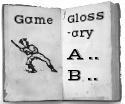Stones
| Game | Stones |
|---|---|
| Game Family | Baseball |
| Location | Ireland |
| Regions | Britain |
| Eras | Predecessor, 1800s |
| Invented | No |
| Tags | |
| Description | According to Gomme (1898), stones was a game played in Ireland in about 1850, using either a ball or a lob-stick. A circle of about a half-dozen stones is arranged, one for each player on the in team. A member of the out team throws the ball/stick at the stones in succession. If the defending player hits it away, all members of the out team must move to another stone. The in and out teams exchange places if a stone is hit by the thrower, the ball/stick is caught, or a player is hit while running between stones. |
| Sources | The Traditional Games of England, Scotland, and Ireland, Volume 2 (New York: Dover [reprint -- original publication 1898], 1964), pages 216-217. |
| Source Image | [[Image:|left|thumb]] |
| Comment | [1] Protoball is uncertain of the meaning of Gomme's sentence on the lobbing of the ball or stick: "[E]ach hit a player gives all his side must change stations." Does it mean that if a player defends a stone by slapping it away, all players on the in team must risk a run to another stone? Sounds like baserunning, no? [2] Gomme allows that one source speculates that this game may have morphed evolved cricket: see Supplemental Text, below. Edit with form to add a comment |
| Query | Edit with form to add a query |
| Has Supplemental Text | Yes |
Comments
<comments voting="Plus" />
Supplemental Text
From Gomme, 1898, page 217:
"Mr. Kinahan, who describes this game, adds a very instructive note, which is worth quoting.
'These games I have seen played over half a century ago [earlier than 1850, if he supplied this text to Gomme in the 1890s], with a lob-stick, but of later years with a ball, long before a crlcket club existed, in Trinity College, Dublin, and when the game [cricket, presumably?] was unknown in a great part of Ireland. At the same time, they may have been introduced by some of the earlier settlers, and afterward degenerated into the games listed above; but I would be inclined to suspect that the Irish are the primitive games, they having since been improved into cricket. At the present day these games nearly everywhere are succeeded by cricket, but often of a very primitive form, the wickets being stones set on end, or a pillar of stones; while the ball is often wooden, and very rudely formed.'"
